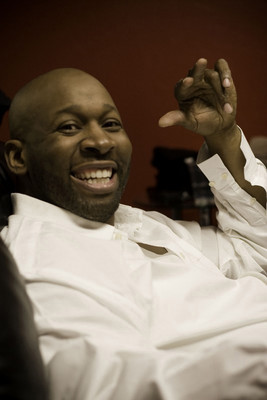The Ex-Basketball Diaries

Hipster and hoops star, he’s the forward who won’t look backward.
So …
Meet Wayman Tisdale: NBA basketball star (12 seasons as center and power forward with the Indiana Pacers, Sacramento Kings and Phoenix Suns) and gold medal-winning Olympian (1984 USA basketball team).
Meet Wayman Tisdale: Survivor who lost a portion of his right leg to bone cancer a decade after retiring from basketball.
Meet Wayman Tisdale: Respected smooth-jazz bass guitarist with eight CDs to his credit (including such basketball-tinged titles as "Power Forward," "In the Zone" and "Rebound"). He’ll perform at Saturday’s nine-hour, City of Lights Jazz Festival blowout at the Clark County Government Center Amphitheater in a lineup including saxophonists Boney James, Marion Meadows and Jessy J., and vocalist Maysa.
Now …
Meet Wayman Tisdale:
Question: Do you ever miss the hoops and the hoopla on the court?
Answer: No. When I retired, I was done with it, ready to move on to the next thing in my life, doing what I love to do probably even more than basketball. Music was my first love. I’m having a ball.
Q: The move you made from star athlete to successful musician is relatively rare. Were people surprised when they saw you in this new light?
A: Very surprised. It’s a very unique move, and to be successful at it, even more so. People aren’t going to see you and buy your music if they don’t think you’re serious, but they’ve taken me seriously from day one. I didn’t try to follow what everybody else told me to do. I knew what I was, I stayed in my lane and gained a niche in music. It’s been amazing that people gravitate to my music. It’s been a dream transition.
Q: You weren’t even into basketball as a kid — when your brothers organized pickup games, you quit early and went to play in the sandbox. How is that possible?
A: I was more into music. I didn’t want to play basketball. My older brothers got me into it and made me like it, you know? They showed me the lucrative side of it. Then I fell in love with the game. But I never threw music away.
Q: You never took music lessons, don’t know what keys your songs are in, don’t know the names of the notes you play. How do you perform without a grounding in the basics?
A: I play it from the feel. It’s beautiful to work like that because I play from my heart. I’m not coming from a state of theory, I’m coming from a state of pure hearing and interpretation.
Q: After your cancer diagnosis, when they began chemotherapy, were the doctors optimistic?
A: The doctor had never given anyone chemo that was my size. They just calculated how much chemo to give me and said, "We hope it doesn’t mess up your kidneys. If it does, sorry." It’s a scary thing when they don’t know what’s going to happen. But I made it through and feeling great.
Q: You’ve said in previous interviews that negative experiences with Bobby Knight, whom you said didn’t want you to succeed when he coached you in the Olympics, actually helped you battle the disease years later. How so?
A: I think he wanted to see how bad I wanted it. I had to prove how much I wanted it. It was a test, to see what type of willpower I had. I knew I had the willpower, and that I’d need it during the chemo. I was able to face it and know what kind of warrior I was. I got a chance to tell Coach Knight last weekend. He really impacted my life, what he did. I didn’t understand it for years until it called on me to do something tougher than the Olympics.
Q: You had a portion of your leg amputated because it was the best way to ensure the cancer wouldn’t return, and now use a prosthetic. How did that spur you to start a foundation for other amputees?
A: It’s so discouraging when you see that only one out of five people who come in for a prosthetic can afford it (it is often not covered by health insurance). I wanted to provide a facility for people to get proper treatment. I’m very honored to do that.
Q: Did the tough times deepen and enrich your music?
A: I had a lot of trials and tribulations, but you know what? It makes it better. Music became more meaningful in a different way. My interpretations, my melodies got better. Things happen for a reason. When you listen to my music, I want to make you happy. That’s my personality.
Contact reporter Steve Bornfeld at sbornfeld @reviewjournal.com or 702-383-0256.